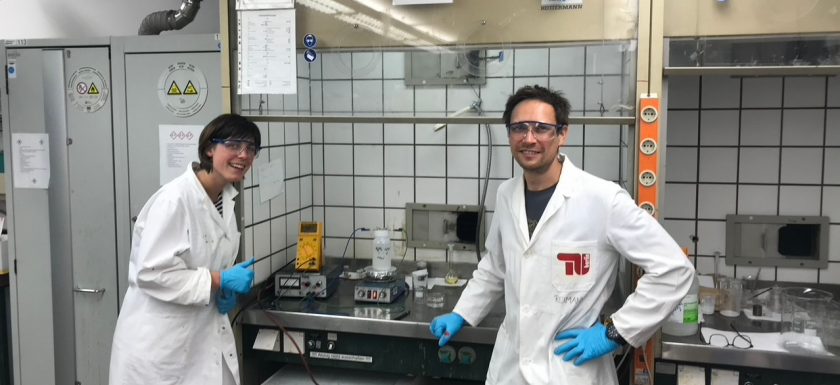
Erika Zaiser is working on her doctoral thesis on superalloys at HZB. She studied in Berlin and Tomsk, Russia, and graduated from TU Berlin with a double Master’s degree in physical engineering. She did her Master’s thesis at HZB, and her supervisor at the time, Dr Florian Vogel, is now also supervising her doctorate. However, he now lives in China. In the interview, I asked Erika how such a doctorate over distance is possible. At the end of the interview, Florian also joined in.
Why did you want to do a doctorate in the first place?
Erika: I enjoyed my Master’s thesis very much and it was quite easy for me to write it. Florian really encouraged me to keep researching. And I thought that a doctoral thesis is the natural continuation of the Master’s thesis, only much longer.
And isn’t it?
Erika: No, it’s clearly different. Now I largely solve problems on my own. That isn’t always easy, especially at the beginning. I’m usually well organised, however when a device breaks down, I have to make sure that I can continue my experiments and plan everything anew. It’s a balancing act: on the one hand I have to make a plan in advance, but on the other hand I need to be flexible.
What did you learn in the last year?
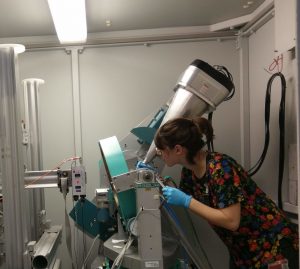
Erika: I keep a very accurate and strict calendar where I enter everything I plan to do and also all appointments. I am getting better at realistically estimating the duration of work steps. In the beginning, I always wanted everything to work and progress very quickly, but it usually never works that way. Accepting this and letting go helped me a lot and I do much better now.
Your supervisor lives in China, what does this mean to you and your work?
Erika: Of course, that doesn’t make it any easier. But we meet regularly for video calls and when I have an idea, we discuss it. He is very supportive, for example when I want to take part in a conference or acquire new skills.
Do you also have someone in Berlin you can turn to with practical problems?
Erika: Yes, there is a postdoctoral researcher who knows her way around my subject. However, she has now moved to BAM (Bundesanstalt für Materialforschung und -prüfung) . Luckily, there are two experienced technicians at the institute whom I can always ask. They sometimes make sure, for example, that orders get through more quickly. That’s worth its weight in gold.
What do you do to relax your mind?
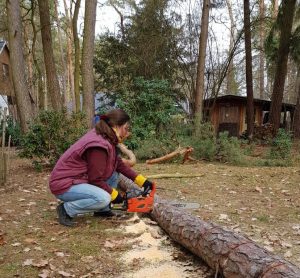
Erika: We have a small child and my husband is also working full time, so we don’t have time for any elaborate hobbies. But we have a garden in the forest with a cabin by the lake. We can totally relax there. There’s no wifi and no distractions, at most the woodpecker knocks.
Now Florian Vogel joins us for the video interview. Hello! What do you actually do in China?
Florian: My wife is Chinese, and also a researcher, we even met at HZB. After she had been abroad with me for a long time, she wanted to live closer to her family again. I found a job as an associate professor at Jinan University in Guangzhou in southern China. I’m even a student at a University here myself and have Chinese classes every day. It’s already good enough for everyday life, but luckily I can give my first lectures in English.
What is your motivation for supervising a doctoral thesis from afar?
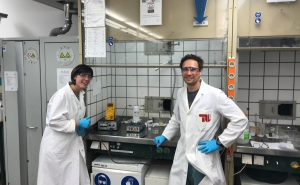
Florian: I had an ongoing project in Germany before leaving and was looking for a Ph.D. candidate. Erika seemed to be a perfect match. We have worked together during her Master Thesis and I was very impressed by the way she worked and the quality she achieved. She even published the results of her Master Thesis in Acta Materialia, a high-quality journal known for its rigorous review process. I want to share my experience, knowing that there are difficult times during the doctorate when nothing works out and you get frustrated. But I also want to pass on that that these difficult phases can be overcome. The most important thing for me is that Erika is successful and that the doctorate serves her as a springboard into an interesting career.
What if you can’t help as a supervisor yourself?
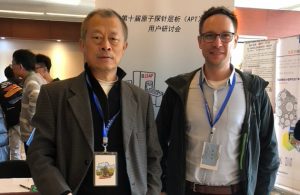
onference.
Florian: That depends. To a certain extent, you can expect the doctoral student to develop the determination to solve the problem herself. But you also think along with them and try to make suggestions. If we hit a roadblock with that approach, or the issues are outside my area of expertise, the next step is to start discussing with colleagues or people within my scientific network that may be more involved with that particular topic or aspect. It is a good learning experience, also for Erika, to discuss a lot with different people and build such a network for herself.
Erika, can you imagine visiting your supervisor?
Erika: I would love to! Ideally, it would be during the writing phase, I would pack up my family and then hop over to China for two or three months.
And Florian, what do you say to that?
Florian: 欢迎你来中国 (huan ying ni lai zhong guo)Welcome to China! I would be happy to welcome Erika for a visit here!
Thank you very much for the interview!
Did you like this interview? You may enjoy also reading other interviews in the series #phdlife: science.hzbblog.de/tag/phdlife
